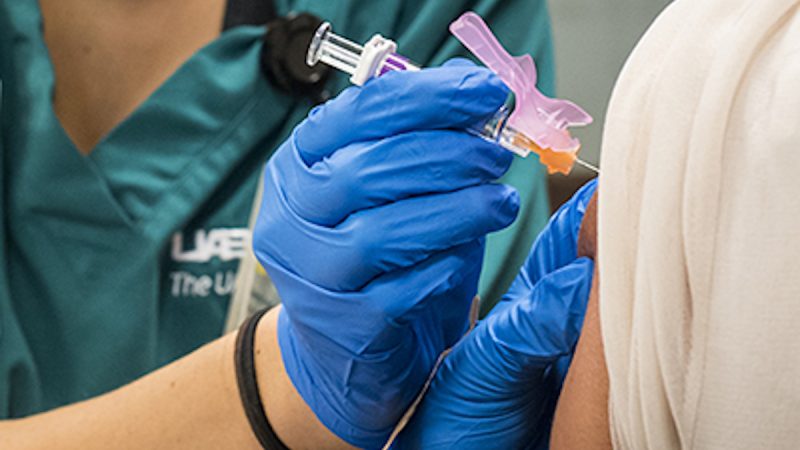Alabama Will Follow CDC Guidelines For COVID-19 Booster Shots
COVID-19 Vaccine administered at UAB. State health officer, Dr. Scott Harris, urges Alabamians to get vaccinated.
Alabama’s leading health official said the state will provide booster shots for COVID-19, following guidance from the Centers for Disease Control and Prevention. At a press conference Friday, State Health Officer Dr. Scott Harris said a third shot should be given to people aged 65 years and older, residents in long-term care settings, and people aged 50–64 years with underlying medical conditions. He said anyone getting the third shot should be fully vaccinated for at least six months. Boosters are now available to those who fall under those categories.
Additionally, Harris said the CDC recommends that people aged 18–49 with underlying medical conditions may get the third shot.
“The distinction being made here is that it really depends on people’s individual risk and benefit. That’s a discussion they will have to have with their healthcare provider,” Harris said.
The CDC also recommends people 18 and up who are at increased risk of contracting the virus, based on their occupation, may receive a booster dose. Harris said that includes healthcare workers, first responders, teachers and grocery store workers.
The CDC has only authorized the third shot for the Pfizer vaccine.
CDC Director Dr. Rochelle Walensky endorses ACIP recommendation for a booster shot of Pfizer-BioNTech #COVID19 vaccine in certain populations & also recommended booster dose for those in high risk occupational/ institutional settings. See full statement. https://t.co/X4HgVB4xJo
— CDC (@CDCgov) September 24, 2021
During the press conference, Harris emphasized demand for monoclonal antibodies, a treatment used to prevent people with COVID-19 from being hospitalized, is far higher than current supply. Federal officials recently changed how states receive monoclonal antibodies from directly ordering them to a coordinated system that rations them to states. With that, Alabama has seen its allotment fall. The state was only allocated about 6,600 doses this week.
“We have had about 3 times as many requests for monoclonals as Alabama is going to have this week. So, it’s a scarce resource and there’s not enough to go around,” Harris said.
While hospitalizations for COVID-19 have been falling in recent weeks, Harris said facilities are still overstretched. The state reported 1731 people hospitalized with the coronavirus Thursday. Intensive care units remain at or above capacity.
According to statistics from Johns Hopkins University, Alabama currently has the nation’s highest death rate for COVID-19. On Friday, the Alabama Department of Public Health reported 13,291 Alabamians have died from the coronavirus since the start of the pandemic. Harris said at least 90 percent of recent deaths were preventable with the vaccine.
“These aren’t numbers or stats,” Harris said. “These are our friends and our family and our loved ones.”
Birmingham is 3rd worst in the Southeast for ozone pollution, new report says
The American Lung Association's "State of the Air" report shows some metro areas in the Gulf States continue to have poor air quality.
Why haven’t Kansas and Alabama — among other holdouts — expanded access to Medicaid?
Only 10 states have not joined the federal program that expands Medicaid to people who are still in the "coverage gap" for health care
Once praised, settlement to help sickened BP oil spill workers leaves most with nearly nothing
Thousands of ordinary people who helped clean up after the 2010 BP oil spill in the Gulf of Mexico say they got sick. A court settlement was supposed to help compensate them, but it hasn’t turned out as expected.
Q&A: How harm reduction can help mitigate the opioid crisis
Maia Szalavitz discusses harm reduction's effectiveness against drug addiction, how punitive policies can hurt people who need pain medication and more.
The Gulf States Newsroom is hiring a Community Engagement Producer
The Gulf States Newsroom is seeking a curious, creative and collaborative professional to work with our regional team to build up engaged journalism efforts.
Gambling bills face uncertain future in the Alabama legislature
This year looked to be different for lottery and gambling legislation, which has fallen short for years in the Alabama legislature. But this week, with only a handful of meeting days left, competing House and Senate proposals were sent to a conference committee to work out differences.








